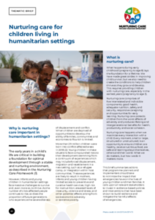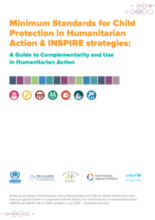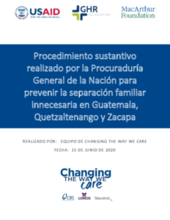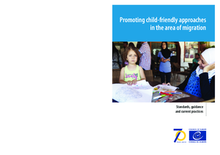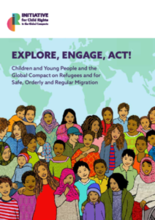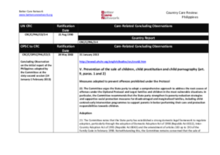Displaying 61 - 70 of 198
This second webinar in the 'Introducing Guidance for Alternative Care Provision During COVID-19' webinar series hosted on 28 January 2021, is aimed at policy makers and explains their role in developing policies and guidance to prevent family separation during an outbreak.
The first webinar, hosted on 27 January 2021, is aimed at health practitioners with the goal of introducing the guidance and helping practitioners understand their role in preventing family separation and supporting unaccompanied and separated children.
The Safeguarding Resource and Support Hub (RSH) aims to support organisations in the aid sector to strengthen their safeguarding policy and practice against Sexual Exploitation, Abuse and Sexual Harassment (SEAH).
This brief summarizes actions that programme planners and implementers should take to minimize the impact that emergencies have on the lives of young children and their families.
The purpose of this note is to clarify the linkages and complementarity between INSPIRE seven strategies for ending violence against children and the 2019 Edition of the Minimum Standards for Child Protection in Humanitarian Action (‘2019 CPMS’); and to provide some practical guidance on how to use INSPIRE and the 2019 CPMS in conjunction for preventing and responding to violence against children in humanitarian settings.
El objetivo principal del informe es sistematizar el procedimiento sustantivo en los Departamentos de Guatemala, Quetzaltenango y de Zacapa realizado por Procuraduría General de la Nación (PGN) en el que se individualiza el tipo de amenaza o vulneración en el caso concreto e identifica si la misma puede ser resuelta mediante una intervención gubernamental específica, sin necesidad de intervención jurisdiccional y su análisis. El documento contiene un estudio del Sistema de Gestión para la Atención Integral de la Niñez y la Adolescencia, en relación al funcionamiento por parte de la Procuraduría General de la Nación de Quetzaltenango, Guatemala y Zacapa, y un análisis de casos resueltos judicialmente en Zacapa que podrían haberse tramitado previamente en la vía administrativa y evitar la institucionalización (gatekeeping mechanism en ingles)
This compilation contributes to the implementation of the objectives of the Action Plan on protecting refugee and migrant children in Europe, adopted by the Committee of Ministers of the Council of Europe, by bringing together international and European standards on child-friendly practices in the context of migration with illustrations from practice of the kind of initiatives, programmes and procedures that serve to implement these standards.
The aim of this module from the book Rights-based Integrated Child Protection Service Delivery Systems is to learn about the child protection services needed during armed conflicts.
This publication is aimed at children and young people (and adults too!) so that they know what the governments of the world have said they will do. As the Global Compacts can be difficult to read, this ‘child and youth friendly’ briefing summarizes what these documents say about migrant and refugee children and young people.
This country care review includes the care related Concluding Observations adopted by the Committee on the Rights of the Child and the Committee on the Rights of Persons with Disabilities.

